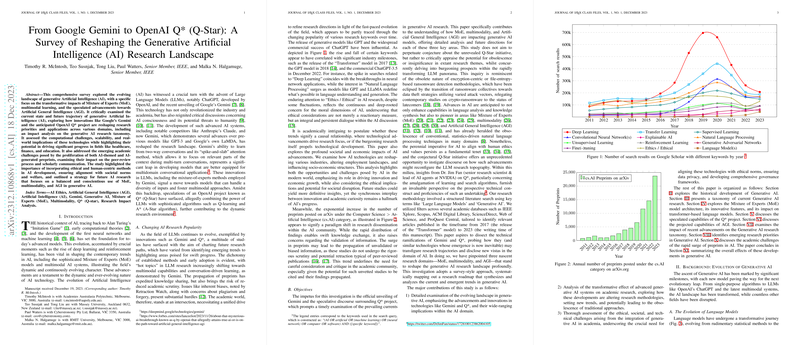Evolution of Generative AI and Its Impact Across Domains
Introduction
Generative AI has undergone remarkable growth, especially with the development of LLMs like ChatGPT. The introduction of models such as Google’s Gemini has further refined the capabilities of AI systems. These advancements have revolutionized the industry and academia, while also rekindling critical discussions about AI's potential threats to humanity and consciousness. A paper provides a comprehensive survey examining how these developments are reshaping research and applications across different fields.
Generative AI Innovations
At the forefront of generative AI innovation are technologies such as Mixtures of Experts (MoE), which allow for dynamic routing and specialized processing of information. Multimodal AI systems, capable of processing various data formats like text, images, audio, and video, are becoming increasingly prominent. The speculative project known as Q* (Q-Star) combines LLMs' capabilities with advanced algorithms, contributing to a dynamic research environment. These technological strides are paving the way for robust multimodal approaches in AI development.
Societal and Ethical Implications
The impact of generative AI reaches far beyond technological boundaries, influencing employment landscapes and socio-economic structures. While these technologies drive innovation and economic growth, they also raise ethical concerns. Aligning AI with societal norms and welfare necessitates strategies that focus on ethical development and a conscientious use of emerging AI models like MoE, multimodality, and the path toward AGI.
Advanced Learning and Research Priorities
In the field of advanced learning, fields such as self-supervised learning, meta-learning, and fine-tuning remain vital. As AI models evolve towards AGI, new research priorities are emerging within multimodality and MoE. These include unraveling bias mitigation techniques, securing data privacy, and exploring the synergy between AI and human ethics.
The Changing Landscape of AI Research
The proliferation of AI-related preprints, particularly in the computer science category, symbolizes a paradigm shift in research dissemination. However, this rapid exchange of findings raises validation concerns as it may lead to unvetted information spreading unchecked. The academic community is now challenged to refine research directions and adapt peer-review mechanisms in light of this fast-paced evolution of generative AI research.
Preprint Explosion and Peer-Review Challenges
The deluge of preprints has made it challenging to perform evidence syntheses due to the sheer volume of available knowledge. There's an urgent need for discourse on managing the growing "mess" of AI-themed research submissions and the strain on the traditional peer-review system. New paradigms for peer review and research dissemination must be explored to maintain the credibility of scientific research in the age of Generative AI.
Conclusion
This survey underscores a critical juncture in generative AI research, marked by innovations that are transforming the capabilities of AI systems. The balance between technological growth and human values is essential, necessitating multidisciplinary research that intertwines ethical, sociological, and technical perspectives. Future advancements in AI must be guided responsibly to ensure they enhance human experiences in alignment with ethical standards and societal wellbeing.
